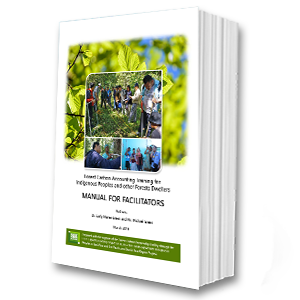pdf Forest Carbon Accounting Training for Indigenous Peoples and Other Forest Dwellers: MANUAL FOR FACILITATORS
665 downloads
Forest Carbon Accounting Training for IPs and other Forest Dwellers - MANUAL FOR FACILITATORS.pdf

Indigenous peoples (IPs) and other forest dependent communities have been the inherent rights holders and custodians of the forests and all the natural resources therein. They have managed, protected and used the forest and natural resources sustainably for generations using their traditional knowledge systems and practices and customary governance long before the UNFCCC considered REDD+ as a climate change mitigation measure.
The forest and its natural resources are the subject of REDD+. IPs have and continue to depend on the forests for social and economic livelihoods, and cultural and spiritual well-being. With no recognition of their contributions to sustainable use and management of forest and its natural resources on their customary lands and territories for decades, they asserted their right to participate fully and effectively in REDD+. They intimated governments, donors and other stakeholders that REDD+ will fail without the full and effective engagement of IPs and other forest communities.
The Conference of Parties (COP) of the UNFCCC adopted decisions that respect and recognize IP rights and the contributions of IPs and forest dependent communities in enhancing traditional knowledge systems and sustainable forest management and to support their full and effective participation in REDD+.
TRAINING OBJECTIVES
This manual aims to improve the knowledge of IPs and forest communities on REDD+, introduce them to forest carbon measurement and monitoring and guide them to transfer the knowledge primarily to IPs and forest communities.
It is intended for community facilitators who are indigenous peoples and/or forest dwellers who have basic knowledge and understanding on climate change including REDD+. The participation of women and youth and gender balance among participants is highly recommended. This training manual can also serve as reference for IPs and forest dwellers who:
- are currently conducting Community-based Monitoring and Information Systems (CBMIS) and want to include forest carbon monitoring;
- are working in the area of forestry and climate change who want to understand forest carbon accounting in the context of REDD+;
- want to contribute ground data to their national government for their National Forest Monitoring System (NFMS) or verify data of their NFMS;
- and others who might find this manual useful.
At the end of the course, participants should have enhanced understanding and are enabled to deliver trainings on the following:
- Indigenous Peoples and REDD+;
- Role of participatory carbon monitoring (PCM) in REDD+;
- Basis of forest carbon accounting;
- Setting up field plots to collect information from the forest;
- Forest measurements required for estimating all carbon pools;
- Calculations used to estimate forest carbon stocks and uncertainty from the field measurements; and
- Quality assurance and quality control.

